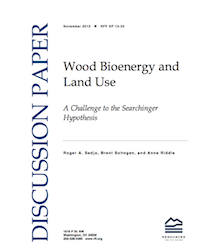A new paper, “Wood Bioenergy and Land Use,” authored by Roger A. Sedjo, Brent L. Sohngen, Anne Riddle on behalf of Resources for the Future attempts to debunk indirect land use change theory (ILUC). The paper looks at how the use of biomass energy will affect the forests.
 Back in 2008, Timothy Searchinger examined the issue related to corn ethanol and posited that substituting corn ethanol for petroleum would increase carbon emissions associated with the land conversion in other areas, such as Brazil. In other words, what would the indirect impact be of planting corn on an acre of land that used to be virgin forest and how would this affect the carbon “savings” of using ethanol, an environmental concern tied to climate change.
Back in 2008, Timothy Searchinger examined the issue related to corn ethanol and posited that substituting corn ethanol for petroleum would increase carbon emissions associated with the land conversion in other areas, such as Brazil. In other words, what would the indirect impact be of planting corn on an acre of land that used to be virgin forest and how would this affect the carbon “savings” of using ethanol, an environmental concern tied to climate change.
The authors point out that the issue is broader than simply corn. If agricultural croplands are drawn into the production of biofuel feedstocks, commodity prices are expected to rise, triggering land conversions overseas, releasing carbon emissions, and offsetting the carbon reductions expected from bioenergy.
Using a general stylized forest sector management model, the study examines the economic potential of traditional industrial forests and supplemental dedicated fuelwood plantations to produce biomass on submarginal lands. It finds that these sources can economically produce large levels of biomass without compromising crop production, thereby mitigating the land conversion and carbon emissions effects posited by the Searchinger hypothesis.
Click here to download the paper.

